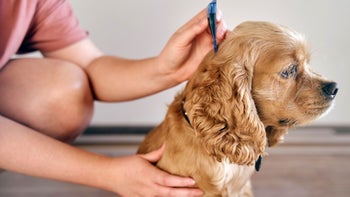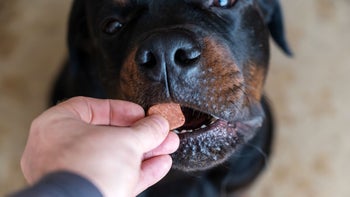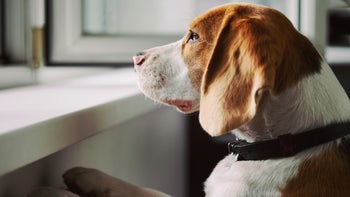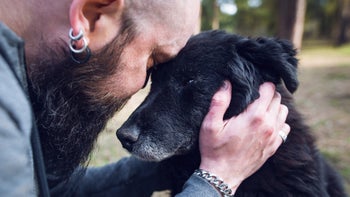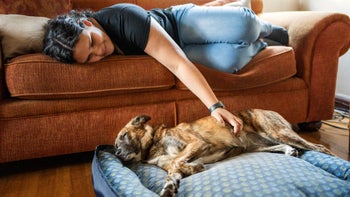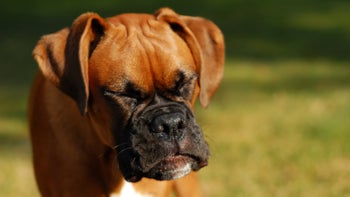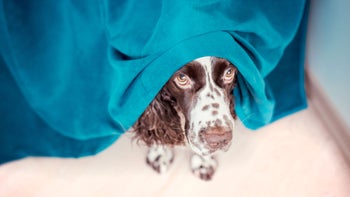
What Does It Mean When Your Dog Licks You, and When Is It a Problem?
Key takeaways:
Your dog may lick you to show they like you or because they want to taste what you had for breakfast.
But obsessive licking may mean your dog has a medical issue that needs to be diagnosed and treated by a vet.
You should also understand the potential health risks from dog licking before allowing your pet to “kiss” you.
Table of contents

Your dog probably has all sorts of endearing behaviors. Perhaps the most adorable — or most annoying, depending on your point of view — is “kissing,” or licking, you.
No one knows for sure why dogs slobber their humans with licks. But some dog professionals have made educated guesses. This post covers insights on dog licking, when licking may signal a serious problem, and what to do if you want your dog to stop licking you.
What it means when your dog licks you
When dogs lick their owners, is it a sign of affection or is it something else? No one knows for sure, but dog experts think licking could mean any or all of the following.
Search and compare options
They’re showing you affection
Your dog’s licks may demonstrate love and friendship, mimicking the way mother dogs lick their puppies as a sign of care. Your dog may feel warmth and safety when they lick you, too.
You taste yummy
Puppies lick their mother’s face to get them to throw up food. (It sounds gross, but it’s easier for a young dog to eat food that’s already been chewed.) Likewise, your dog may lick you in hopes of getting a taste of your breakfast burrito or steak dinner.
What’s more, your skin releases a slight amount of salt, a tasty treat for furry friends.
Your dog may be trying to tell you something
Your dog has a limited number of ways to communicate with you. And licking may be one of them.
Check your surroundings the next time your dog dives into a lick fest. See if their water bowl is empty, for example. They may be licking you simply to say, “Hey, can I get a refill?” Or they may be telling you they need to go outside for a potty break.
Your dog may be stressed
Dogs may lick their owners excessively when they’re feeling stressed. A wide range of triggers, such as a medical condition or separation anxiety, can cause jitters in dogs. Since some dogs don’t know how to soothe their stress, they resort to licking.
Canine cognition: Ever wonder what’s going on in your hound’s head? This article explores what dogs think about and how their minds work.
Snap, crackle, pop! Many dogs stress out over loud, scary sounds. Here, one pet owner shares how she calms her pups during fireworks.
Fever facts: These tips will show you know how to take your dog’s temperature and treat a fever at home.
When licking may signal a medical issue
There’s a difference between normal dog licking and obsessive licking, and it’s important for you to tell them apart. Normal licking is when your dog gives you a little love or wipes crumbs off the kitchen floor, then walks away satisfied. Dogs also like to groom themselves and other dogs with their tongues occasionally, and that’s OK.
But if your dog licks you, themselves, or objects like the carpet or furniture nonstop, they’re demonstrating obsessive licking. This is a sign your dog may have a medical or behavioral issue that needs attention.
Potential issues that can cause obsessive licking include:
Separation anxiety
Boredom
Problems with digestion
Gum disease, gum injury, or a chipped tooth
Read more like this
Explore these related articles, suggested for readers like you.
What should you do if you’re worried about your dog’s licking?
If you suspect your dog’s licking may indicate a medical or behavioral issue, consider taking one or more of the following steps:
Visit your vet. Your vet can thoroughly examine your pet, run a variety of tests, and let you know if they have a medical condition. Treating an underlying medical issue should curb a licking problem.
Work with a trainer. A behavior specialist can help identify sources of stress or anxiety and teach your dog how to overcome them and stop licking.
Redirect the licking. When your dog starts to lick you, ask them to sit and pet them instead. Or try getting your dog to play a game or give them a treat. Appropriate dog toys can also do the trick — anything positive to distract your pet from licking you.
Should you let your dog lick you?
It’s really up to you whether or not you let your dog lick you. Do you love the attention and affection? If yes, let your dog slobber away. But first, be aware that their licking comes with slight health risks for you.
Dogs like to stick their noses in all sorts of yucky places, like other dogs’ pee, poop, and privates. This makes their tongue and saliva more likely to carry germs that may harm you.
If you’re healthy, chances are your pet’s licks won’t make you sick. But you may want to steer them away from slobbering on your nose, mouth, eyes, and any open wounds, where you’re more likely to absorb their germs. Direct your dog toward your neck or even your hands, instead. Just make sure you wash your hands afterward.
How can you get your dog to stop licking you so much?
To get your dog to stop licking you, you’ll want to start by taking your dog to the vet to rule out any medical conditions. If your dog seems to be licking you out of habit, there are several things you can do to curb the behavior.
Work on training
When your dog tries to lick you, ask them to do things like sit or roll over. Then, reward them with a treat or affection. This redirects a behavior that doesn’t get rewarded — their licking — to behaviors that do get rewarded.
Make sure they get plenty of exercise
Take your dog for walks to help them burn off excess energy and manage stress. Most dogs need at least 15 minutes of daily exercise and many breeds need over 1 hour a day.
Stay positive
Focus on praising your dog when they do what you ask them to do, rather than yelling at or punishing them when they’re licking you or doing something wrong.
Provide chew toys
Turn your dog’s attention to their chew toys or play fetch with them. This will keep their mouths busy and their focus away from licking.
Spray the spots where they often lick
Many pet stores sell lick-deterrent spray, or you can make one at home. Check with your vet to find out which option is best for your pup. Then, squirt the areas where your dog likes to lick with the solution.
Frequently asked questions
Licking your face is a treat for your dog, especially if you’ve just eaten. They love getting a taste of your last meal or snack. They may also like the saltiness of your skin.
If your dog licks you nonstop, there’s definitely a problem. It could be a medical condition like anxiety, parasites, or gum disease. So make sure to visit your vet if your dog becomes obsessed with licking.
The bottom line
Licking in dogs may simply be a sign of love and affection. But if your dog is licking you nonstop, it could signal an underlying medical condition.
Get your vet to examine your pet and rule out any medical problems. Then, work with an animal trainer or try distracting your pooch to redirect their licking behavior. If you enjoy their licks, remember to keep your dog’s tongue away from your nose, mouth, and eyes for your own benefit.
Why trust our experts?



References
Blue Cross. (2024). Why do dogs lick?
Canadian Public Health Association. (n.d.). Human diseases transmitted by dog poop.
College of Veterinary Medicine Veterinary Teaching Hospital. (2021). Anal sac disease. Washington State University.
Davis, K. (2002). Dog is constantly licking. Veterinary Partner.
Hall, N. J., et al. (2015). The role of environmental and owner-provided consequences in canine stereotypy and compulsive behavior. Journal of Veterinary Behavior.
Peninsula Humane Society & SPCA. (n.d.). Licking.
Regional Animal Services of King County. (n.d.). Dog behavior tips.
Tynes, V. V. (2008). Help! My dog licks everything. DVM360.






